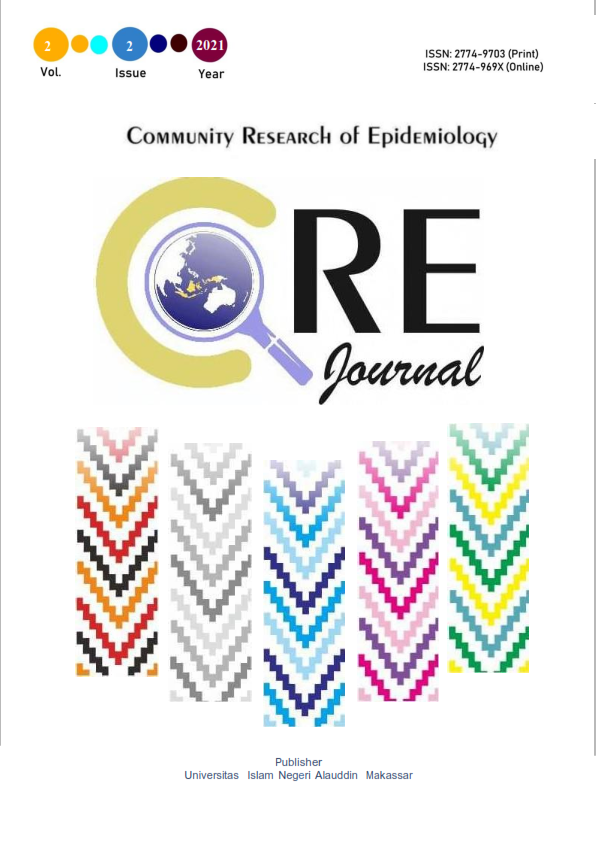Clove flower powder (Syzygium Aromaticum) as an alternative plant controlling Aedes Aegypti larvae
Abstract
Dengue Hemorrhagic Fever (DHF) is still one of the most important health problems in Indonesia. Indonesia is a country with the highest dengue cases in Southeast Asia. The purpose of this study was to determine the effectiveness of clove flower powder (Syzygium aromaticum) as a medium in killing Aedes aegypti larvae. This type of research is a simple experimental study with a post test only group control design. This research was conducted to determine the effectiveness of clove powder in killing Aedes Aegypti larvae using doses of 2 mg/10L, 4 mg/10L, 6 mg/10L, 8 mg/10L and 10 mg/10L. Data collection techniques are carried out by making observations, namely by making direct observations. The results showed that each level of the test material (P1, P2, P3, P4, and P5) within 1x24 hours of observation showed a significant difference in the mortality of Aedes Aegypti larvae. The conclusion of this study was that clove powder (Syzygium Aromaticum) was effective in killing Aedes Aegypti larvae with varying results according to the level. Even so, it is still necessary to carry out further research by testing more local plant species as a medium that can kill Aedes Aegypti larvae by paying attention to environmental factors and it is advisable to examine the comparison between Zanzibar clove flowers and ordinary clove flowers
References
Ambari, Y., & Suena, N. M. D. S. (2019). Uji Stabilitas Fisik Formulasi Lotion Anti Nyamuk Minyak Sereh. Jurnal Ilmiah Medicamento, 5(2).
Aulia, c. R. (2016). Potensi minyak atsiri daun cengkeh (syzygium aromaticum) terhadap kematian nyamuk aedes aegypti dengan metode semprot (doctoral dissertation, universitas muhammadiyah purwokerto).
Cahyani, D. N., & Asngad, A. (2020). Efektivitas Ekstrak Daun Tembelekan dengan Penambahan Daun Cengkeh dalam Bentuk Spray sebagai Insektisida Nabati terhadap Mortalitas Nyamuk. Prosiding SNPBS (Seminar Nasional Pendidikan Biologi dan Saintek) Ke-5.
Chintihia, T. (2015). Efek Larvasida Ekstrak Daun Cengkeh (Syzygium aromaticum L.) terhadap Aedes aegypti. Jurnal Agromedicine, 2(4), 510-515.
Depkes RI. 2017, INSIDE (Inspirasi dan Ide) Litbangkes P2B2 vol II : Aedes Aegypti Vampir Mini yang Mematikan, Badan Penelitian dan Pengembangan Kesehatan Depkes RI, Jakarta.
Dominica, D., & Handayani, D. (2019). Formulasi dan Evaluasi Sediaan Lotion dari ekstrak daun lengkeng (Dimocarpus longan) sebagai Antioksidan. Jurnal Farmasi dan ilmu kefarmasian Indonesia, 6(1), 1-7.
Fayemiwo, K. A., Adeleke, M. A., Okoro, O. P., Awojide, S. H., & Awoniyi, I. O. (2014). Larvicidal efficacies and chemical composition of essential oils of Pinus sylvestris and Syzygium aromaticum against mosquitoes. Asian Pacific journal of tropical biomedicine, 4(1), 30-34.
Fahrisal, F., Pinaria, B., & Tarore, D. (2019). Penyebaran Populasi Nyamuk Aedes aegypti sebagai Vektor Penyakit Demam Berdarah Dengue di Kota Tidore Kepulauan (Distribution of Aedes aegypti Mosquito Population as A Vector of Dengue Fever Disease in Tidore Kepulauan City). JURNAL BIOS LOGOS, 9(1), 28-33.
Getas, D. I., & Kristinawati, E. (2021). Ekstrak Bunga Cengkeh sebagai Insektisida terhadap Mortalitas Nyamuk Aedes Aegypti Metode Semprot. Jurnal Penelitian dan Kajian Ilmiah Kesehatan Politeknik Medica Farma Husada Mataram, 7(2), 161-168.
Gunawan, C. N., Tjahjani, S., & Soeng, S. (2009). Perbandingan Ekstrak Batang Sereh (Cymbopogon Citratus) dan Citronella Oil Sebagai Repelen terhadap Nyamuk Culex Sp Dewasa Betina. Maranatha Journal of Medicine and Health, 8(2), 150108.
Kaya, A. O., Suryani, A., Santoso, J., & Rusli, M. S. (2015). The effect of gelling agent concentration on the characteristic of gel produced from the mixture of semi-refined carrageenan and glukomannan. Int J Sci Basic Appl Res, 20, 313-324.
Kihampa, C., Joseph, C.C., Nkunya, M.H.H., Magesa, S.M., Hassanali, A. & Heydenreich, M. (2019). Larvicidal and IGR Aktivity of Extract Tanzanian Plants Againts Dengue Vector Mosquitoes. J Vektor Borne Disease, 46(2):145-152.
Pamungkas, R. W., Syafei, N. S., & Soeroto, A. Y. (2016). perbandingan efek larvasida minyak atsiri daun cengkeh (Syzygium aromaticum L.) varietas zanzibar dengan temephos terhadap larva nyamuk Aedes aegypti. Pharmaceutical Sciences and Research, 3(3), 4.
Palgunadi, B. U., & Rahayu, A. (2011). Aedes aegypti sebagai vektor penyakit demam berdarah dengue. Surabaya: Universitas Wijaya Kusuma Surabaya.
Suparman, N., & Papuangan, N. (2017). Pemetaan populasi dan tipe varietas lokal tanaman cengkeh (Syzygium aromaticum L.) di Kecamatan Pulau Ternate. In Makalah disajikan dalam Seminar Nasional Penerapan Ilmu Pengetahuan dan Teknologi, Pontianak (pp. 23-24).
Susanti, S., & Suharyo, S. (2017). Hubungan lingkungan fisik dengan keberadaan jentik Aedes pada area bervegetasi pohon pisang. Unnes Journal of Public Health, 6(4), 271-276.
Salaki, C. L., Wungouw, H., & Makal, H. V. (2021). Efektivitas Biolarvasida Serai Wangi (Cymbopogon nardus) Dengan Daun Cengkeh (Syzygium aromaticum L.) Terhadap Larva Aedes aegypti. JURNAL ILMIAH SAINS, 21(2), 124-129.
Sari, L. R., Budiyono, B., & Hestiningsih, R. (2017). Daya tolak repellent bentuk lotion dengan ekstrak bunga kecombrang (Nicolaia speciosa Horan) terhadap nyamuk Aedes aegypti Linn. Jurnal Kesehatan Masyarakat (Undip), 3(3), 754-763.
Taher, D.M. & Papuangan, N. (2015). Potensi Cengkeh (Syzygium aromaticum) Varietas Avo Biolarvasida Alami nyamuk Anopheles subpictus dan Ae. aegypti. Prosiding Seminar Nasional Masyarakat Biodiversitas Indonesia, 6(1):1478-148


